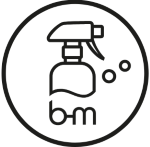
Dishwashers & washing machines
What you’ll need
- Citric Acid
- Microfibre Cloth (optional)
Method
-
Simply add 7-8 tablespoons of Citric Acid to your empty appliance and choose a medium-temperature rinse cycle (up to 40 degrees).
- Then, take a damp, soft Microfiber Cloth and wipe down the appliance to get rid of any leftover residue.
Use for:
Break down hard water deposits and removes build-up in dishwashers and washing machines.

Electronic Screens:
Phones, laptops, tablets, televisions, etc., all come with a protective coating to reduce smudges. Citric Acid can break down this layer, revealing the layers meant to be protected.

Sealed Wood:
Citric Acid can degrade the wax sealant, causing the protective layer to break
down and leaving a cloudy appearance. It also makes the surface more susceptible to further damage.

Natural Stone:
Citric Acid can etch or pit stone, granite, marble, and quartz surfaces so it should never be used to clean natural stone surfaces. The enzymes in Citric Acid will break down the delicate surface layer of these materials, corroding slowly over time.
Store Citric Acid sealed tightly, in a cool, dry place, out of reach of children and pets.
Avoid breathing in Citric Acid as it can cause upper respiratory symptoms, always measure out the Citric Acid powder in a well-ventilated area. Whilst Citric acid is found in food items in a small quantity as a preservative if large amounts of Citric Acid are ingested it could cause nausea, vomiting, and diarrhoea.
Citric Acid can irritate your eyes and skin. Take care not to spill the powder and wear rubber gloves when working with this substance.
